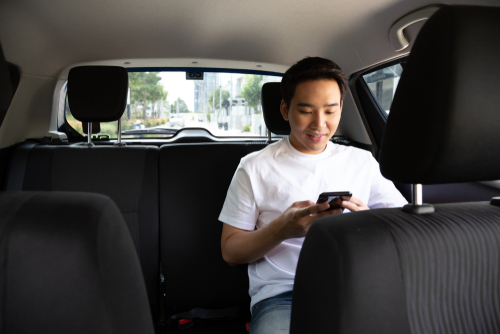When Your Vacation Takes an Unexpected Turn: Tourist Injuries in Rideshare Crashes
You’re visiting South Florida for a relaxing getaway, using rideshare services to explore the vibrant culture and beaches, when suddenly your vacation becomes a medical emergency after a crash. Being injured as a tourist in an unfamiliar city adds layers of complexity to an already stressful situation – you’re dealing with local laws you don’t know, insurance systems you’re unfamiliar with, and medical care far from home. The confusion about what steps to take next can be overwhelming, especially when you’re trying to navigate Florida’s unique insurance requirements while recovering from injuries.
💡 Pro Tip: Save all rideshare app receipts and screenshot your trip details immediately after an accident – this information often disappears from the app after 24-48 hours.
The Soffer Firm has been voted Super Lawyers "Rising Star" and "National Trial Lawyers – Top 40 Under 40" multiple years because of our dedication to clients. We work on a contingency basis, meaning we don’t get paid unless you do. Our track record includes millions recovered for our clients. Our Florida personal injury lawyers are here to guide you through your legal case. Contact us today at 305-503-5634.
Your Rights as an Out-of-State Visitor in Florida Rideshare Crashes
Florida’s insurance laws operate differently than most states, which can catch tourists off guard after rideshare accidents in Miami. The state requires all motor vehicles, including rideshare vehicles, to carry Personal Injury Protection (PIP) insurance that provides $10,000 in medical and disability benefits regardless of who caused the accident. As a tourist, you have the right to access these benefits even though you’re not a Florida resident, but there’s a critical catch – Florida’s 14-day rule requires accident victims to seek medical care within 14 days of the crash to receive PIP benefits.
Beyond PIP coverage, Florida recently changed its negligence laws on March 24, 2023, shifting from pure comparative negligence to a modified system. This means if you’re found to be more than 50% at fault for your injuries, you cannot recover any damages – a significant change that affects how rideshare accident claims are evaluated.
💡 Pro Tip: Don’t assume your home state’s insurance laws apply in Florida – the Sunshine State’s unique PIP system and new comparative fault rules can significantly impact your claim.
Critical Deadlines and Steps After Your Rideshare Crash
Time moves quickly when you’re dealing with injuries, but Florida law moves even faster with strict deadlines that can make or break your claim. Understanding the timeline for rideshare accidents in Miami helps you protect your rights while focusing on recovery. Each deadline serves a purpose in Florida’s legal system, and missing even one can severely limit your compensation options.
- Immediate (at scene): Contact local law enforcement per Section 316.065 if injuries occurred or property damage exceeds $500 – this creates the official crash report needed for insurance claims
- Within 14 days: Seek medical treatment to qualify for PIP benefits – after this window closes, you lose access to the $10,000 in immediate medical coverage
- Within 30 days: Purchase your crash report from floridacrashportal.gov to obtain insurance information from all parties involved
- Within 60 days: Submit PIP claims to the rideshare driver’s insurance – delays can result in reduced benefits or claim denials
- Within 2 years: File any personal injury lawsuit under Florida’s statute of limitations for negligence claims
💡 Pro Tip: Set phone reminders for each deadline – being from out of state doesn’t extend these time limits, and courts strictly enforce them.
Navigating Insurance Claims and Legal Options as a Non-Resident
Resolving rideshare accidents in Miami as a tourist requires understanding the intersection of multiple insurance policies and Florida’s unique laws. First, the rideshare driver’s PIP insurance should cover 80% of your reasonable medical expenses up to $10,000, regardless of fault. However, if your injuries exceed this amount or result in permanent injury, you may need to pursue additional compensation through the at-fault party’s liability coverage or the rideshare company’s million-dollar policy.
The Soffer Firm understands the unique challenges tourists face after Florida accidents, particularly the difficulty of managing claims while trying to return home. Since all claims related to the same healthcare provider must be brought in one action under Florida law, coordinating your medical treatment and legal representation becomes crucial. Working with a law firm that handles the complexities of Florida’s insurance requirements allows you to focus on recovery while ensuring all deadlines are met and your rights are protected.
💡 Pro Tip: Before leaving Florida, gather contact information for all medical providers and ensure someone locally can receive important legal documents on your behalf.
Special Considerations for Out-of-State Medical Treatment
One of the most challenging aspects of being injured in rideshare accidents in Miami as a tourist involves coordinating medical care between Florida and your home state. Florida’s PIP insurance typically covers 80% of reasonable medical expenses, but complications arise when you need follow-up treatment after returning home. Insurance companies often scrutinize out-of-state medical bills more heavily, arguing about whether continued treatment relates to the Florida accident.
Documenting Your Medical Journey Across State Lines
Creating a clear medical paper trail becomes essential when treatment spans multiple states. Before leaving Florida, obtain complete medical records from every provider you saw, including emergency rooms, urgent care facilities, and any specialists. Request detailed discharge instructions that specify necessary follow-up care, as insurance adjusters may question whether your home-state treatment connects to the original incident. Some tourists make the mistake of assuming their health insurance will coordinate with Florida PIP coverage, but these systems rarely communicate effectively without legal intervention.
💡 Pro Tip: Ask your Florida doctors to write detailed referrals for home-state providers, specifically stating that follow-up care is medically necessary due to your rideshare accident injuries.
Understanding Rideshare Insurance Layers and Tourist Vulnerabilities
Rideshare accidents involve multiple insurance policies that activate based on the driver’s status at the time of the crash, creating a complex web that can trap unsuspecting tourists. When you consult a lawyer about rideshare accidents in Miami, they’ll explain how coverage shifts between the driver’s personal insurance, the rideshare company’s contingent coverage, and the commercial policy during active rides. This layered system often leads to finger-pointing between insurers, with each trying to shift responsibility to others.
Why Tourists Face Unique Insurance Challenges
Out-of-state visitors encounter specific vulnerabilities in Florida’s insurance system that residents don’t face. Your home state’s insurance may not fully understand Florida’s PIP requirements, leading to coverage gaps or claim denials. Additionally, rideshare companies may try to apply your home state’s laws instead of Florida’s, particularly regarding the new modified comparative negligence standard that bars recovery if you’re more than 50% at fault. Understanding Florida Statute 768.81 – Comparative Fault becomes crucial, as insurance adjusters might attempt to shift excessive blame onto tourists unfamiliar with local traffic patterns or road conditions.
💡 Pro Tip: Never accept an insurance company’s fault determination without legal review – tourists often get unfairly blamed for accidents due to "unfamiliarity with local roads."
Frequently Asked Questions
Common Concerns for Injured Tourists
Tourists injured in rideshare accidents face unique questions that locals don’t encounter, from handling claims across state lines to understanding Florida’s distinctive insurance requirements. These concerns multiply when dealing with rideshare accidents in Miami, where multiple insurance policies and strict deadlines create additional complexity.
💡 Pro Tip: Keep a dedicated folder (physical or digital) for all accident-related documents – you’ll need quick access to these materials even after returning home.
Navigating the Legal Process from Afar
Managing a legal claim from another state might seem daunting, but modern technology and experienced legal representation make it manageable. Understanding what to expect helps reduce anxiety about the process.
💡 Pro Tip: Most legal proceedings can be handled remotely, but confirm with your attorney which situations might require your physical presence in Florida.
1. Can I still receive compensation if I’ve already left Florida after my rideshare accident?
Yes, leaving Florida doesn’t forfeit your rights to compensation, but you must still meet all deadline requirements. The critical 14-day window for seeking medical treatment to qualify for PIP benefits is based on the accident date, not your location. Many tourists successfully pursue claims after returning home by working with Florida attorneys who understand how to coordinate out-of-state medical treatment and legal proceedings.
2. How does being a tourist affect my rideshare accident claim in Miami compared to residents?
While tourists have the same legal rights as residents in rideshare accidents in Miami, practical challenges include coordinating medical care across states, attending legal proceedings remotely, and dealing with insurance companies unfamiliar with Florida law. The PIP benefits apply equally to tourists, providing $10,000 in medical coverage regardless of residency, but you may face additional scrutiny from insurance adjusters who assume out-of-state visitors won’t pursue claims aggressively.
3. What happens if the rideshare driver blames me for the accident because I’m unfamiliar with Miami roads?
Being unfamiliar with local roads doesn’t automatically make you at fault. Under Florida’s modified comparative negligence law effective March 24, 2023, fault is determined by actual actions, not familiarity with the area. The court examines specific behaviors like failing to yield, speeding, or distracted driving. However, if you’re found more than 50% at fault, you cannot recover damages under the new law, making it crucial to properly document the accident circumstances.
4. Do I need to hire a Florida lawyer, or can my home state attorney handle my rideshare accident case?
You need a lawyer licensed to practice in Florida because your case falls under Florida law and would be filed in Florida courts. Your home state attorney cannot represent you in Florida courts unless they’re also admitted to the Florida Bar. However, some law firms have multi-state practices or can work with your home attorney as co-counsel if needed for specific aspects of your case.
5. How long do I have to decide whether to pursue a legal claim for my rideshare injuries in Miami?
While Florida’s statute of limitations gives you two years to file a personal injury lawsuit, waiting can hurt your case. The 14-day PIP deadline is non-negotiable, and evidence disappears quickly – witnesses forget details, rideshare data gets deleted, and insurance companies may close their initial investigations. Most attorneys recommend at least consulting with legal counsel within the first month after your accident to preserve all options.
Work with a Trusted Rideshare Accidents Lawyer
When you’re injured as a tourist, having local legal representation becomes even more critical. A Florida attorney understands the state’s unique insurance requirements, court procedures, and how to coordinate your case while you recover at home. They can handle the complex interactions between multiple insurance companies, ensure all Florida-specific deadlines are met, and represent your interests without requiring multiple trips back to Miami-Dade County. The right legal team serves as your local advocate, protecting your rights while you focus on healing in familiar surroundings.
The Soffer Firm has been voted Super Lawyers "Rising Star" and "National Trial Lawyers – Top 40 Under 40" multiple years because of our dedication to clients. We work on a contingency basis, meaning we don’t get paid unless you do. Our track record includes millions recovered for our clients. Our Florida personal injury lawyers are here to guide you through your legal case. Contact us today at 305-503-5634.

